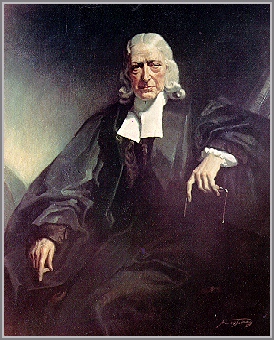A Pentecostal Season: The Methodists in England and America, Part 1

John Wesley
On May 9, 1740 Wesley reported an incident that happened 10 or 11 years before where John and Charles Wesley took a walk in a meadow intending to sing psalms in praise to God. Just as they started to sing Charles burst out into loud laughter. Before long, John too was laughing uncontrollably.[14] In his Second Letter to Bishop Lavington, Wesley noted the bishop commenting on this event from his Journal, saying “Though I am not convinced that these fits of laughing are to be ascribed to Satan, yet I entirely agree, that they are involuntary and unavoidable.” Wesley responded that he entirely agreed with that statement but added: “But I must still go farther: I cannot but ascribe them to a preternatural agent; having observed so many circumstances attending them which cannot be accounted for by any natural causes.”[15]
It is important to understand that these experiences are not isolated incidents in Wesley’s ministry. They are illustrative of experiences with the supernatural manifestation of the power of God that were frequent throughout his ministry. Readers of Wesley will note less reporting of these later in his ministry, but it is possible that by then they were not unusual enough to report.
Wesley was clearly not a Reformed cessationist. He wrote: “I do not recollect any Scripture wherein we are taught that miracles were to be confined within the limits either of the apostolic age … or any period of time, longer or shorter, even till the restitution of all things.”[16]
In his Journal he wrote, “The grand reason why the miraculous gifts were so soon withdrawn, was not only that faith and holiness were well nigh lost; but that dry, formal, orthodox men began even then to ridicule whatever gifts they had not themselves, and to decry them all as either madness or imposture.”[17]
In a sermon he wrote: “It does not appear that these extraordinary gifts of the Holy Ghost were common in the Church for more than two or three centuries … The real cause was, ‘the love of many’, almost of all Christians, so called, was ‘waxed cold.’ The Christians had no more of the Spirit of Christ than the other heathens … This was the real cause why the extraordinary gifts of the Holy Ghost were no longer to be found in the Christian Church; because the Christians were turned heathens again, and had only a dead form left.”[18]
In his writings, Wesley testified to a belief in demons and spiritual warfare. He believed in and experienced miraculous healings. He believed in the gift of prophecy, visions and dreams. He testified to the ministry of angels.
Now let us speak with other tongues
the new strange language of Thy love.
—Charles Wesley in “A Hymn For Pentecost”
John’s brother, Charles Wesley, wrote A Hymn For Pentecost that is not in our United Methodist hymnal. In the 5th verse he wrote: Now let us speak with other tongues/ the new strange language of Thy love.
Category: Church History, Summer 2018


